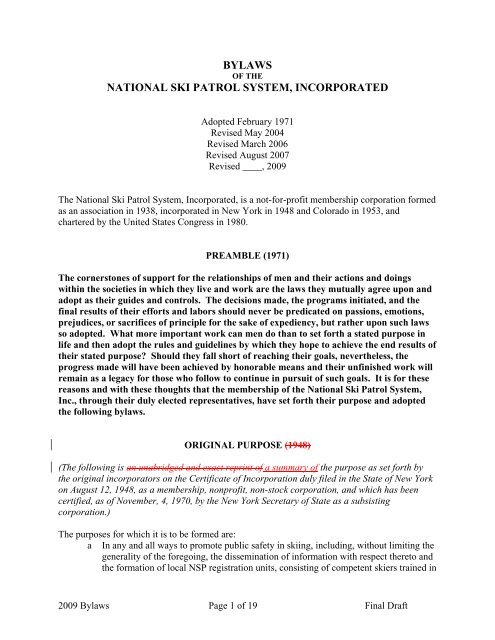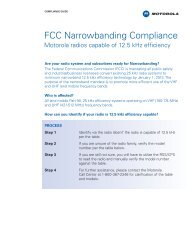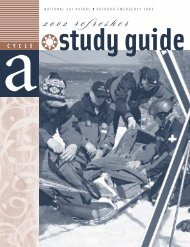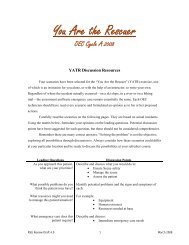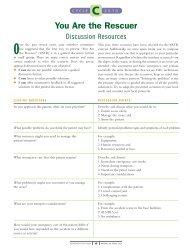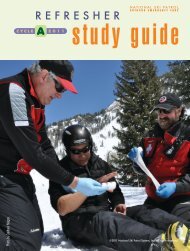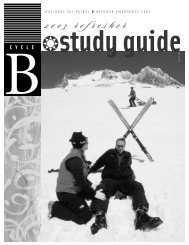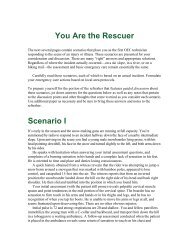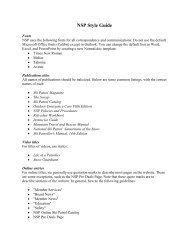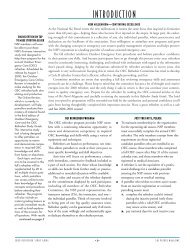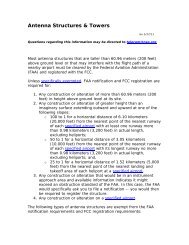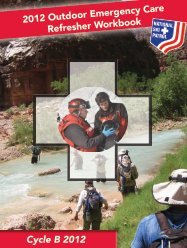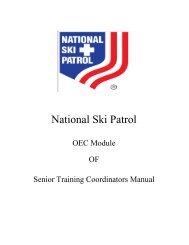BYLAWS NATIONAL SKI PATROL SYSTEM, INCORPORATED
BYLAWS NATIONAL SKI PATROL SYSTEM, INCORPORATED
BYLAWS NATIONAL SKI PATROL SYSTEM, INCORPORATED
Create successful ePaper yourself
Turn your PDF publications into a flip-book with our unique Google optimized e-Paper software.
<strong>BYLAWS</strong><br />
OF THE<br />
<strong>NATIONAL</strong> <strong>SKI</strong> <strong>PATROL</strong> <strong>SYSTEM</strong>, <strong>INCORPORATED</strong><br />
Adopted February 1971<br />
Revised May 2004<br />
Revised March 2006<br />
Revised August 2007<br />
Revised ____, 2009<br />
The National Ski Patrol System, Incorporated, is a not-for-profit membership corporation formed<br />
as an association in 1938, incorporated in New York in 1948 and Colorado in 1953, and<br />
chartered by the United States Congress in 1980.<br />
PREAMBLE (1971)<br />
The cornerstones of support for the relationships of men and their actions and doings<br />
within the societies in which they live and work are the laws they mutually agree upon and<br />
adopt as their guides and controls. The decisions made, the programs initiated, and the<br />
final results of their efforts and labors should never be predicated on passions, emotions,<br />
prejudices, or sacrifices of principle for the sake of expediency, but rather upon such laws<br />
so adopted. What more important work can men do than to set forth a stated purpose in<br />
life and then adopt the rules and guidelines by which they hope to achieve the end results of<br />
their stated purpose Should they fall short of reaching their goals, nevertheless, the<br />
progress made will have been achieved by honorable means and their unfinished work will<br />
remain as a legacy for those who follow to continue in pursuit of such goals. It is for these<br />
reasons and with these thoughts that the membership of the National Ski Patrol System,<br />
Inc., through their duly elected representatives, have set forth their purpose and adopted<br />
the following bylaws.<br />
ORIGINAL PURPOSE (1948)<br />
(The following is an unabridged and exact reprint of a summary of the purpose as set forth by<br />
the original incorporators on the Certificate of Incorporation duly filed in the State of New York<br />
on August 12, 1948, as a membership, nonprofit, non-stock corporation, and which has been<br />
certified, as of November, 4, 1970, by the New York Secretary of State as a subsisting<br />
corporation.)<br />
The purposes for which it is to be formed are:<br />
a In any and all ways to promote public safety in skiing, including, without limiting the<br />
generality of the foregoing, the dissemination of information with respect thereto and<br />
the formation of local NSP registration units, consisting of competent skiers trained in<br />
2009 Bylaws Page 1 of 19 Final Draft
the administration of first aid, for the purpose of preventing accidents and rendering<br />
speedy assistance to persons sustaining accidents; to solicit contributions of money,<br />
services and other property for, and generally to encourage and assist in carrying out,<br />
the foregoing purposes in every way.<br />
b In furtherance but not in limitation of the foregoing, the corporation shall have power<br />
and authority:<br />
1. To acquire money, securities or other property, real or personal, or rights or<br />
services of any nature, by gift, legacy or otherwise, without limitation as to<br />
amount or value except such limitation, if any, as may now or hereafter be<br />
imposed by law; to hold, invest, use or license others to use, sell or otherwise<br />
dispose of any money, securities, property, rights or services so acquired; and<br />
2. To exercise any and all powers (including the borrowing of money and<br />
securing of the same, the making of conveyances, assignments and contracts,<br />
and the incurring of obligations), which may be conferred by law and which<br />
may be necessary or appropriate to the purposes above mentioned.<br />
In the event of the dissolution of the corporation, all of its property and assets shall pass or be<br />
transferred by action of the members of the corporation with the approval of the Supreme Court,<br />
New York County, or in case of the failure of the members to act, by direction of said court, to a<br />
corporation or corporations (organized under the laws of the United Stated of America or any<br />
state thereof) whose property and assets are likewise devoted to the promotion of public safety,<br />
in trust for such purpose, or to trustees for the purpose of promoting public safety.<br />
The corporation is not organized for pecuniary profit, and shall not engage in any activities for<br />
pecuniary profit, and no officer, director, member, or employee of the corporation shall receive<br />
any pecuniary profit from the operations thereof except reasonable compensation for services in<br />
effecting or carrying out one or more of its activities.<br />
ARTICLE I<br />
NAME & PURPOSE<br />
1.1 Name – The National Ski Patrol System, Incorporated is the official, legal name of<br />
this organization but any use of the following variations or abbreviations shall mean the<br />
same: (1) National Ski Patrol System, Inc., (2) National Ski Patrol, (3) “NSP,” (4)<br />
“NSPS,” or (5) “NSPS, Inc.” These Bylaws will refer to the organization as the “NSP”<br />
for brevity.<br />
1.2 Purpose – The original purpose of the NSP was to promote public safety in snow skiing,<br />
organize “ski patrols”, and train “ski patrollers” to provide first aid and transportation<br />
services to injured skiers. The original purpose remains but over time has been expanded<br />
by the conduct of the members to include under the broad authority of the Articles of<br />
Incorporation into all the seasons and now may include service anywhere for any reason<br />
to aid to local, state or federal government, agencies, communities or rescue<br />
2009 Bylaws Page 2 of 19 Final Draft
organizations, civilian or military when requested or whenever there is a need. The NSP<br />
also provides training for its members and others for theseis purposes.<br />
ARTICLE II<br />
MEMBERSHIP<br />
2.1 Membership - Any person accepted by the NSP as a member and who meets and<br />
maintains the minimum requirements established by the Board of Directors, regardless of<br />
race, creed, color, or sex shall be a member. Membership is subject to classification with<br />
each class being granted or restricted as to voting privileges.<br />
2.2 Categories of Membership – Each member shall be classified as a “Traditional Member”<br />
or “Associate” and these terms shall have the following definitions:<br />
a. Traditional Member shall pass the required training or obtain the required<br />
certification as established by the Board of Directors of the NSP, be current in<br />
payment of all dues or other charges, and be an active member in good standing with<br />
the NSP and a NSP affiliated Alpine or Nordic Patrol. A Traditional Member<br />
shall also include any former Traditional Member who is currently registered with<br />
the NSP as an Alumnus Member or any Candidate who is currently registered and in<br />
good standing with the NSP and is in the process of completing his or her training to<br />
obtain the status of a Traditional Member.<br />
b. Associate shall have passed the required training or obtained the required<br />
certification as established by the Board of Directors of the NSP, be current in<br />
payment of all dues or other charges, be active and in good standing with the NSP<br />
but is not a member of an affiliated Alpine or Nordic Patrol nor has declared an<br />
intent as a candidate to train to become a Traditional Member. The category of<br />
Associate includes anyone who is not classified as a Traditional Member under the<br />
Bylaws and the current Policies and Procedures of this organization and includes but<br />
is not limited to Mountain Hosts, Associates and others who are not Traditional<br />
Members.<br />
2.3 Voting Rights & Limitations – Traditional Members shall have the right to vote on all<br />
matters submitted to them. Associates shall not have the right to vote.<br />
2.4 Membership Sub-categories - The classification of Traditional Member and Associates<br />
may also be divided into various sub-categories as determined by the Board of Directors<br />
based on skill, training or any other classification it deems advisable. These<br />
classifications or sub-categories shall be published in the NSP Policies & Procedures<br />
Manual.<br />
2.5 Membership Governance – Continued Membership or Associate status shall require<br />
continued adherence to the policies and procedures established and from time to time<br />
2009 Bylaws Page 3 of 19 Final Draft
amended by the NSP Board of Directors and published in the NSP Policies & Procedures<br />
Manual.<br />
2.6 Membership – In Good Standing – The phrase “in good standing” means one who is<br />
current and has met all requirements for membership or for a particular class of associate<br />
status in the NSP and who is not under any form of censure or sanction by the NSP,<br />
which would affect one’s active status in the organization.<br />
ARTICLE III<br />
BOARD OF DIRECTORS<br />
3.1 Authority & Function - The governing body of the NSP shall be the Board of Directors.<br />
The NSP Board of Directors shall have supervisory control over the direction, affairs,<br />
administration, committees, programs and publications of the NSP. It shall determine the<br />
Board’s policies and procedures, be the ultimate decision making authority over all matters<br />
and shall interpret these bylaws. The Board of Directors shall establish the NSP’s<br />
financial policies and shall be accountable for the NSP’s assets.<br />
3.2 Board Member Duty – Each board member serves in a fiduciary capacity and owes the<br />
National Ski Patrol the duty of care, obedience, diligence, loyalty and good faith. Each<br />
director shall practice confidentiality regarding all matters, avoid conflicts of interest and<br />
stay informed on the body of law regarding the National Ski Patrol System, Incorporated.<br />
3.3 Composition & Terms of Office - The Board of Directors shall consist of thirteen<br />
members, including the National Chair. The full term of office for each director shall be<br />
three years. The terms shall be staggered so that four or five directors are elected each<br />
year. No member of the Board of Directors, including the National Chair, may serve for<br />
more than a total of six years.<br />
3.4 Meeting Quorum - A meeting quorum shall consist of a majority of the Board members<br />
who are elected.<br />
3.5 Actions of the Board of Directors - Actions of the Board of Directors, upon the declaration<br />
of a quorum, shall be by a majority vote.<br />
3.6 Election of the National Chair and Selection of the Assistant National Chair - The National<br />
Chair shall be a member of the Board of Directors and shall be elected from its members.<br />
Any member of the Board of Directors is eligible to be elected. A National Chair shall be<br />
elected annually at each Mid-winter Meeting and shall assume the duties of office when<br />
elected. An incumbent may be reelected for up to four, one-year terms (a maximum of<br />
four years as National Chair), as long as the six-year total term limit for directors is not<br />
2009 Bylaws Page 4 of 19 Final Draft
exceeded. The Assistant National Chair shall be selected each year in conjunction with the<br />
National Chair by a process to be determined by the Board of Directors.<br />
3.7 Duties & Voting Rights of the National Chair - The National Chair shall be the chief<br />
elected officer of the NSP. The National Chair shall serve as the Chair of the Board of<br />
Directors but shall have a tie-breaking vote only. The National Chair shall serve as an exofficio<br />
member of all committees, except the Nomination Committee and shall make all<br />
required appointments to standing and other committees, except as otherwise provided in<br />
these Bylaws. The National Chair shall communicate with the members of the NSP and<br />
make such suggestions that tend to promote the welfare and increase the usefulness of this<br />
organization. The National Chair shall perform all duties that are incident to the office or<br />
as may be prescribed by the Board of Directors.<br />
3.8 Vacancies in the Office of National Chair – Vacancies in the office of National Chair shall<br />
be filled by a vote of the Board of Directors at their next scheduled meeting. The Board of<br />
Directors and the Executive Director will confer to determine if an interim replacement for<br />
the National Chair is necessary. If the decision is made that an interim replacement is<br />
necessary, the Assistant National Chair will temporarily serve in this capacity.<br />
3.9 Presiding Officer when National Chair is Absent – The Assistant National Chair shall<br />
preside at meetings when the National Chair is absent. In the event the Assistant National<br />
Chair is absent or unable to preside the National Chair shall designate who shall preside.<br />
3.10 Vacancies on the Board of Directors - When a vacancy occurs, which will leave the<br />
position vacant for less than one year; the vacancy shall be filled at the next regularly<br />
scheduled election. When a vacancy occurs, which will leave the position vacant for one<br />
year or more, the vacancy shall be filled by the Board of Directors at the next regularly<br />
scheduled meeting by appointing the individual who received the most votes in the last<br />
Board of Directors election and who was not elected. If there was more than one vacancy,<br />
the vacancies shall be filled in order with the longest term remaining being assigned to the<br />
candidate in the last election who obtained the largest number of votes and who was not<br />
elected. If the person selected declines to sit on the Board of Directors, then the next<br />
individual receiving the most votes would be selected until someone agrees to fill the<br />
vacant position. If there are no candidates from the last election to fill the vacancy, or<br />
would agree to fill it, such vacant position shall be filled at the next regularly scheduled<br />
election for the Board of Directors. A person so selected will serve the remaining balance<br />
of the Board Member’s term. The individual selected shall assume the Board of Director’s<br />
position upon notification by the National Chair of his or her appointment and his or her<br />
acceptance of the appointment. Based on the term limit of six years contained in a former<br />
section, no person may stand for election unless they are eligible to serve the entire term of<br />
three years. Based on the term limit of six years contained in a former section, no person<br />
may stand for election unless they are eligible to serve the entire term of three years.<br />
3.11 Annual Meeting - The Annual Meeting of the Board of Directors shall be held in the<br />
spring of each year on a date set by the Board of Directors. Meetings of the Board of<br />
Directors may be held at any location determined by resolution of the Board of Directors.<br />
2009 Bylaws Page 5 of 19 Final Draft
3.12 Mid-winter Meeting - A Mid-winter Meeting shall be held each year, usually in the month<br />
of January, in the greater Denver area or in some other location or by electronic means as<br />
determined by resolution by the Board of Directors.<br />
3.13 Special Meetings - Special Meetings of the Board of Directors may be called by the<br />
National Chair or by any seven members of the Board of Directors with two days written<br />
notice to each member of the Board of Directors. The notice shall state the date, time,<br />
place, purpose and type of meeting (i.e. electronic, in person, etc.) or the purpose of the<br />
meeting may be designated at any prior meeting. See Colorado Statute §7-128-203.<br />
3.14 Voting by the Traditional Membership – The Board of Directors from time to time may<br />
conduct a vote of the Traditional Membership on any issue or issues it deems appropriate.<br />
3.15 Member Participation in Meetings - Passive participation in all meetings, except executive<br />
sessions, by NSP members shall be allowed.<br />
3.16 Waiver of Meeting Notice - Any meeting called with less than two days notice requires the<br />
written consent of all members of the Board of Directors. Consent may be given before,<br />
during or after the meeting consistent with Colorado Statute §7-128-204.<br />
ARTICLE IV<br />
OFFICERS<br />
4.1 National Officers & National Legal Advisor - The national officers of the NSP shall<br />
consist of the following:<br />
a. The NSP Board of Directors<br />
b. The NSP National Chair<br />
c. The NSP Assistant National Chair and<br />
d. The NSP Treasurer.<br />
In addition to the National Officers there shall also be a legal advisor who is not an<br />
officer but serves as legal counsel to the National Ski Patrol System, Incorporated and<br />
this person shall be called the NSP Legal Advisor.<br />
4.2 Qualifications, Responsibilities & Duties of National Officers – Qualifications,<br />
responsibilities and duties of the National Officers shall be determined by the Board of<br />
Directors and published in the NSP Policies and Procedures Manual.<br />
4.3 Subordinate Officers for Traditional Members – The following officers shall comprise<br />
the chain of command for the Patrol unit through the Division level:<br />
a. Patrol – a Patrol Representative shall administer a Patrol.<br />
b. Section – a Section Chief shall administer a Section.<br />
2009 Bylaws Page 6 of 19 Final Draft
c. Region – a Region Director shall administer a Region.<br />
d. Division – a Division Director shall administer a Division.<br />
4.4 Subordinate Officers for Associate Units – The officers who shall comprise the chain of<br />
command for Associate Units shall be established by the NSP Board of Directors and<br />
published in the Policies & Procedures Manual.<br />
4.5 Qualifications, Responsibilities & Duties of Division Directors – The Board of Directors<br />
shall determine the qualifications, responsibilities and duties for the Division Directors.<br />
The NSP Board of Directors shall publish these qualifications, responsibilities and duties<br />
in the NSP Policies and Procedures Manual.<br />
4.6 Appointment of Assistants by Subordinate Officers - Division Directors shall have<br />
complete authority to appoint assistants to carry out their objectives. Patrol<br />
Representatives, Section Chiefs, and Region Directors, shall have complete authority to<br />
appoint assistants to carry out their objectives subject to their Division bylaws, policies<br />
and procedures. Officers of Associate Units or units comprised of Associates formed<br />
under the NSP but not under the Ski Patrol structure shall have authority defined by the<br />
NSP Board of Directors to appoint assistants as these units are formed and the<br />
appointment process and limitations shall be published in the NSP Policies and<br />
Procedures Manual.<br />
ARTICLE V<br />
<strong>NATIONAL</strong> COMMITTEES<br />
5.1 Standing Committees – There shall be three Standing Committees: Governance, Finance,<br />
and Planning.<br />
5.2 Standing Committee Chair and Appointments – The Chair of each Standing Committee<br />
shall be a member of the Board of Directors. A member of the National Office Staff shall<br />
be appointed jointly by the NSP National Chair and the NSP Executive Director to serve<br />
as Liaison Member. The Liaison Member shall not vote on matters but shall otherwise<br />
participate in the committee’s activities and serve as a liaison between the Standing<br />
Committee and the National Office. All other appointments to the Standing Committee<br />
shall be voting members. These appointments shall be made by the NSP National Chair<br />
and shall be submitted to the Board of Directors for ratification not more than fifteen<br />
days after the appointment. Appointees may serve by authority of the National Chair’s<br />
appointment until the appointment is ratified or rejected. All members of Standing<br />
Committees shall have time limits and the terms shall be staggered as between the<br />
members to provide equal numbers as possible being appointed and rotating off each<br />
year. Members of the NSP Board of Directors and Division Directors will be evenly<br />
divided among the three Standing Committees except for the National Chair of the NSP<br />
2009 Bylaws Page 7 of 19 Final Draft
Board of Directors. Each Standing Committee shall report at least annually to the NSP<br />
Board of Directors regarding committee operations and proposed changes needed on all<br />
matters for which it has responsibility.<br />
5.3 Standing Governance Committee – There shall be a Standing Governance Committee<br />
appointed to review matters related to the governance of the NSP and to have<br />
responsibility for oversight of the NSP Bylaws. It shall perform its tasks in accordance<br />
with the approved Committee Charter. Attached to the Standing Governance Committee<br />
shall be the Bylaws Oversight Sub-committee. This sub-committee shall review all<br />
governance matters that might affect the Bylaws and shall from time to time report their<br />
findings to the Governance Committee with special authority to also make reports<br />
directly to the NSP Board of Directors.<br />
5.4 Standing Finance Committee – There shall be a Standing Finance Committee appointed<br />
to review the financial health and accountability of the organization for past, present and<br />
future financial matters. It shall perform its tasks in accordance with the approved<br />
Committee Charter.<br />
5.5 Standing Planning Committee – There shall be a Standing Planning Committee appointed<br />
to review matters related to the planning of future matters for the NSP and the future<br />
policies and programs of the NSP. It shall perform its tasks in accordance with the<br />
approved Committee Charter.<br />
5.6 Special Committees and Subcommittees – The National Chair of the Board of Directors<br />
at the request of the Chair of any Standing Committees may establish Special<br />
Committees or Subcommittees to operate and assist that Standing Committee. The Board<br />
of Directors may appoint a Special Committee or Subcommittee for any limited, special<br />
purpose and may designate the time or event for its dissolution.<br />
5.7 Process for Appointing Standing Committee Chairs and Membership – The National<br />
Chair shall appoint the Standing Committee Chairs and the members of the Standing<br />
Committees subject to confirmation by the NSP Board of Directors at its next meeting.<br />
The NSP National Chair must provide notice of the appointment to the NSP Board of<br />
Directors within fifteen days of the appointment. Appointees may serve by authority of<br />
the National Chair’s appointment until the appointment is ratified or rejected.<br />
5.8 Reports to the Board of Directors – Standing Committee Chairs shall prepare an annual<br />
report and as many special reports of their activities and expenditures as requested and<br />
deliver them to the NSP Board of Directors as ordered. Special Committee Chairs and<br />
Subcommittee Chairs shall prepare an annual and as many special reports of their<br />
activities and expenditures and deliver them to the entity creating them by the time<br />
established for the filing of that report as ordered by the entity creating them for<br />
presentation at the Annual Meeting of the Board of Directors.<br />
5.9 Proposals by Committees to the Board of Directors – When a Standing Committee files a<br />
proposal, motion or action item with the NSP Board of Directors, then a second to the<br />
2009 Bylaws Page 8 of 19 Final Draft
proposal, motion or action item by a member of the NSP Board of Directors shall not be<br />
required. When any other committee (other than a Standing Committee) files a proposal,<br />
motion or action item with the NSP Board of Directors, then a second is required.<br />
ARTICLE VI<br />
<strong>NATIONAL</strong> PROGRAMS<br />
6.1. National Programs, Operations and Staffing – The Board of Directors shall authorize<br />
National Programs and establish the purpose, governance and operation of each program.<br />
The Director of the Program shall be appointed by the National Chair subject to<br />
ratification by the NSP Board of Directors at its next meeting. The NSP National Chair<br />
must provide notice of the appointment to the NSP Board of Directors within fifteen days<br />
of the appointment. Appointees may serve by authority of the National Chair’s<br />
appointment until the appointment is ratified or rejected.<br />
6.2 National Programs, Membership – The National Program Staff shall include at a<br />
minimum, the National Program Director and the Division Supervisors who are appointed<br />
by the Division Directors with the exception of the Outdoor Emergency Care (OEC)<br />
Program. The OEC Division Program Supervisor is appointed by joint agreement of the<br />
OEC National Program Director and the Division Director for that division.<br />
6.3 National Programs, Annual Report – Program Directors shall prepare an annual report and<br />
as many special reports of their activities and expenditures as requested and deliver them<br />
to the NSP Board of Directors as ordered.<br />
ARTICLE VII<br />
<strong>NATIONAL</strong> EXECUTIVE STAFF<br />
7.1 Executive Staff – An executive or administrative staff may be employed by the NSP and<br />
shall have such duties, titles and other functions as prescribed by the NSP Board of<br />
Directors. Staffs positions may be filled by paid or volunteer staff at the discretion of the<br />
NSP Board of Directors.<br />
7.2 Executive Director – An Executive Director shall be appointed by the NSP Board of<br />
Directors who shall supervise the staff and make reports to the Board of Directors at such<br />
times as shall be required.<br />
2009 Bylaws Page 9 of 19 Final Draft
ARTICLE VIII<br />
ADMINISTRATIVE STRUCTURE OF <strong>SKI</strong> <strong>PATROL</strong>S<br />
8.1 Geographic Composition of Divisions – The Board of Directors shall have the authority<br />
to establish the geographical composition and name of each Division. The Board of<br />
Directors shall also have the authority to establish a Professional Division with no<br />
geographic limitations but whose boundaries are national in scope and whose members<br />
are paid Patrollers.<br />
8.2 Division Policies, Procedures, Rules, Regulations & Bylaws – Divisions may adopt<br />
policies, procedures, rules, regulations and bylaws to provide for the conduct of the<br />
Division’s own internal affairs on the condition that they are consistent with these<br />
Bylaws, the NSP Policies & Procedures Manual, the NSP Articles of Incorporation and<br />
the Federal Charter. The bylaws of any Division may not limit the term of office for<br />
national officers nor may they limit or otherwise inhibit the eligibility of an NSP member<br />
to serve in an officer position, staff position, or advisor position in a Division that is not<br />
their current registered Division or at the national level.<br />
8.3 Chain of Command & Structure of Divisions – The following chain of command shall be<br />
utilized by the Divisions:<br />
a. Patrol – consisting of a Patrol Representative and one or more additional NSP<br />
Patrollers.<br />
b. Section – consisting of two or more Patrols.<br />
c. Region – consisting of two or more Sections or two or more Patrols if Sections<br />
are not recognized by the Division, and<br />
d. Division – consisting of two or more Regions.<br />
8.4 Accounting & Reporting - Division Directors shall be directly responsible for the<br />
governance and financial affairs within their divisions and shall submit reports at least<br />
annually to the National Office, the NSP Board of Directors, the Internal Revenue<br />
Service and to any other office or agency of the state or federal government as required<br />
by law. All officers within the division shall submit reports to the Division Director as<br />
required in a timely manner.<br />
8.5 Geographic Composition of Regions & Sections – Division Directors shall have the<br />
authority to establish the geographical composition of the Regions and Sections within<br />
their Division.<br />
8.6 Region & Section Structure – The bylaws, policies and procedures, rules or regulations of<br />
a Section shall not be in conflict with the Region or Division above it and shall observe<br />
the rule of sovereignty of the NSP and likewise the Region shall not be in conflict with its<br />
Division and observe the rule of sovereignty of the NSP.<br />
2009 Bylaws Page 10 of 19 Final Draft
8.7 Election or Appointment of Division Line Officers – Election or appointment of Patrol<br />
Representatives, Section Chiefs, Region Directors and Division Directors shall be<br />
determined by Division policy but shall not be inconsistent with the current Joint<br />
Statement of Understanding between the NSP and NSAA.<br />
ARTICLE IX<br />
ADMINISTRATIVE STRUCTURE OF UNITS COMPRISED OF ASSOCIATES<br />
The Board of Directors may establish the structure of the Units comprised of Associates and<br />
assign them to divisions or create a parallel structure with designated officers that are identified<br />
by names common to the incident command system or any other form they deem appropriate<br />
with the elections, appointments, duties and responsibilities of each to be set forth in the NSP<br />
Policies & Procedures Manual.<br />
ARTICLE X<br />
<strong>NATIONAL</strong> ELECTIONS<br />
10.1 Nominations Committee - There shall be a Nominations Committee consisting of two<br />
Division Directors (selected by the Division Directors), two members of the current<br />
Board of Directors (selected by the Board of Directors) and a fifth member called the<br />
Member-at-Large who shall be selected by the other four members of the committee.<br />
The five members shall elect the Committee Chair from among their number. Division<br />
Director and Board Member eligibility shall be rotated among those eligible and be<br />
limited to those with terms not expiring in the current year. Any Traditional Member in<br />
good standing, who is not and has not been a Division Director or Board Member, is<br />
eligible to be the Member-at-Large.<br />
10.2 Nominations Committee Purpose - The primary purpose of the Nominations Committee<br />
is to ensure that highly qualified members submit applications for election to the Board of<br />
Directors. This is done via general communications and publicity. Division leadership<br />
should also be encouraged to identify candidates for the Board of Directors.<br />
10.3 Number of Nominees for Board of Directors Elections - The ballot sent to the<br />
membership, if there are enough applicants, shall contain at least two candidates per<br />
vacancy and no more than four candidates per vacancy.<br />
2009 Bylaws Page 11 of 19 Final Draft
10.4 Reducing Nominees for Board of Directors Elections - If the Nominations Committee<br />
needs to reduce the number of applicants as required by these Bylaws, then this will be<br />
done with consideration to the overall applicant’s qualifications, taking into consideration<br />
the “List of Needs” as developed by the Board of Directors. Overall qualifications for an<br />
applicant should include consideration of the applicant’s education, experience and the<br />
ability to organize thoughts and communicate.<br />
10.5 Qualifications for Board of Directors - Any Volunteer, Auxiliary, Alumni or Paid<br />
Traditional Member in good standing who has been an Active Traditional Member for<br />
over five years, is qualified to be a candidate. Anyone on the Board of Directors<br />
applying for a second term will automatically be placed on the ballot and may not be<br />
rejected by the Nominations Committee.<br />
10.6 Election Schedule for Board of Directors – When a deadline or date is named in this<br />
section, the date shall be the date stated unless the offices for the NSP are not open for<br />
business for any reason. If the date falls on a date the office is not open for business, then<br />
the date shall be the next date the office is open for business. The time for the deadline of<br />
any term named in this section shall be 4:00 PM Mountain Time Zone, United States of<br />
America. The following dates shall apply to all elections:<br />
a. February 15 – the deadline for selection of Division Directors and Board of<br />
Directors Representatives to the Nominations Committee. It is noted by tradition<br />
these selections are usually made at the Mid-winter Meeting.<br />
b. March 15 – the deadline for selection of the Member-at-Large and Committee<br />
Chair of the Nominations committee.<br />
c. March 20 – the deadline for delivering the “List of Needs” to the Nominations<br />
Committee. The “List of Needs” is developed by the Board of Directors with<br />
input from the Division Directors.<br />
d. April 1 – the deadline for the Nominations Committee to announce the “Call for<br />
Candidates” unless extended for cause by the Board of Directors. The call is<br />
posted on the NSP Website, distributed via emails and other publications to NSP<br />
members. Nominations Committee packages should be available and include<br />
application instructions, “List of Needs” and the schedule for the election.<br />
e. June 1 – the deadline for submitting application forms to the Nominations<br />
Committee. The list of applicants is to be promptly posted on the NSP Website.<br />
Applications received after the deadline will be considered for the next year’s<br />
election.<br />
f. September 15 – the deadline to announce the nominees who have been selected<br />
by the Nominations Committee to the membership via an e-blast. Information<br />
about the qualifications of each nominee shall be posted on the NSP Website by<br />
this date.<br />
g. October 15 – the deadline for the notice to be sent to the voting members that<br />
electronic voting has commenced.<br />
h. December 1 – the date for the close of voting.<br />
i. January 1 – the commencement date for the newly elected Board of Directors<br />
members to take office.<br />
2009 Bylaws Page 12 of 19 Final Draft
10.7 Voting for the Board of Directors – Each Traditional Member in good standing shall have<br />
the opportunity to cast one vote for each open seat for the Board of Directors.<br />
Cumulative voting shall not be allowed. The candidates receiving the most votes shall<br />
fill the available vacancies. There shall be no minimum quorum for voting.<br />
10.8 National Board Tie Election Resolutions - The following rules shall apply when an<br />
election has resulted in a tie.<br />
a. Drawing Lots to Decide the Election – The chief election official shall resolve the<br />
tie when the tie involves the last position or positions by drawing lots. This chief<br />
election official shall prepare as many slips of paper as there are candidates<br />
involved in the tie election and write the word “Elected” on as many slips of<br />
paper as there are offices to be filled; and the words “Not Elected” on the<br />
remaining slips. All the slips shall be folded to conceal the writing and placed in<br />
envelopes of identical size, shape and color. The envelopes are then sealed and<br />
placed in a box. At the time and place appointed for the drawing, each of the<br />
candidates (or their designated agent) may draw one envelope from the box. Each<br />
candidate drawing an envelope containing the word “Elected” shall be deemed<br />
legally elected to the office in question. The election official shall provide written<br />
notice of the election results.<br />
b. Travel Expenses & Appointing Agents – Travel to and from the location of the<br />
drawing shall be at the expense of the candidates. Candidates involved in a<br />
drawing may designate, in writing, an agent to act on their behalf.<br />
c. Time Deadline to Resolve an Election Tie – Whenever an election result in a tie,<br />
the election official shall have three business days from the time the tie is declared<br />
to resolve the tie by drawing lots.<br />
ARTICLE XI<br />
REMOVAL FROM <strong>NATIONAL</strong> OFFICE<br />
11.1 Removal – Any national officer, national program director or coordinator, standing<br />
committee member, or member of the NSP Board of Directors may be removed from<br />
office by the procedures established by the NSP Board of Directors as published in the<br />
NSP Policies & Procedures Manual subject to the following special procedures set forth in<br />
this article. No member of the nominating committee, any national program coordinator,<br />
or any member of a standing committee may be removed from office by the National<br />
Chair with or without cause without the approval or ratification of the Board of Directors.<br />
11.2 Procedures for Removal – The following procedures and limitations shall apply to removal<br />
of the officers designated:<br />
a. Basis for Removal – Removal from office must be based upon one or more of the<br />
following: (1) gross, repeated and continued failure to observe material NSP rules or<br />
regulations, (2) misrepresentation or abuse of any NSP position for personal gain, (3)<br />
2009 Bylaws Page 13 of 19 Final Draft
gross malfeasance in office or (4) conduct that brings significant disrepute or harm to<br />
the NSP. The final determination regarding the existence or absence of these bases<br />
shall be at the sole discretion of the Board of Directors.<br />
b. Complaint for Removal – Any three or more National Board Members may file a<br />
complaint for removal under this Article. The complaint shall be in writing, signed<br />
by each of the complaint makers, and set forth the following information: (1) the<br />
name and national position of the subject of the complaint, (2) the basis for the<br />
complaint and (3) concise and specific allegations of fact, which tend to substantiate<br />
the basis for the complaint. The complaint shall be sent to the National Chair of the<br />
Board of Directors, unless the person whose removal is sought is the National Chair,<br />
in which case the complaint shall be sent to the Finance Committee Chair who shall<br />
oversee the processing of the complaint.<br />
c. Filing & Notice of the Complaint – The national officer to whom the complaint is<br />
directed shall refer the matter to the Board of Directors within fifteen days after<br />
receipt by mailing copies to each member of the Board of Directors. The complaint<br />
shall also be sent by certified mail to the person who is the subject of the complaint.<br />
d. Resolution Procedures – The Board of Directors shall investigate the complaint and<br />
meet to discuss the matter. When a complaint is filed against a Board Member, that<br />
person shall not take part in the consideration of the complaint. The Board of<br />
Directors shall provide reasonable opportunity to be heard to the complainants, the<br />
subject of the complaint and such other persons as the Board of Directors deems<br />
appropriate. A vote to remove must be supported by a two-thirds majority of the<br />
entire Board of Directors. The complaint shall be dismissed with prejudice if the<br />
Board of Directors does not support removal.<br />
e. Timing of Removal – If the Board of Directors decides to remove the subject of the<br />
complaint, the removal is effective immediately following the tabulation of the vote.<br />
f. Removal & Bar from Office – Removal in accordance with this Article shall bar the<br />
person from service as a national officer, national program director, national<br />
coordinator, standing committee member, and/or member of the National Board of<br />
Directors for four years from the effective date of the removal.<br />
ARTICLE XII<br />
GRIEVANCE PROCEDURES<br />
12.1 Right of Appeal - Any member who is aggrieved by the action or inaction of a superior<br />
officer or governing body shall have the right of appeal, except regarding matters related<br />
to the operations of a Patrol, which operations are not governed, directed or controlled by<br />
the NSP. Appeals shall follow the procedure set forth in this Article. No retribution shall<br />
be taken against any member during the appeal.<br />
12.2 Appeal Initiation & Limitations - The appeal processes shall be initiated in writing and<br />
sent directly to the superior officer or governing body making the decision. The appeal<br />
shall be initiated and received not later than sixty days after the decision was rendered.<br />
2009 Bylaws Page 14 of 19 Final Draft
Extensions for filing an appeal may be granted by the superior officer or the governing<br />
body.<br />
12.3 Status Quo during an Appeal - The status quo shall be maintained pending the outcome of<br />
the appeal. The superior officer or governing body, once notice of the appeal has been<br />
received, shall commence an investigation and render an opinion as quickly as practical<br />
under the circumstances. The business and processes of the NSP should not be impeded<br />
by lengthy delays.<br />
12.4 Appeals & the Chain of Command - The chain of command for appeals dealing with a<br />
Patrol shall be (1) the member, (2) the Patrol Representative, (3) Section Chief (if any), (4)<br />
Region Director, (5) Division Director, (6) National Chair of the Board of Directors and<br />
(7) the NSP Board of Directors. The chain of command for appeals dealing with any Unit<br />
of Associates shall be (1) the member, (2) the Unit Leader or Unit Representative (3) the<br />
chain of command of the Division if assigned to a Division or the chain of command as<br />
established by the NSP Board of Directors upon the creation of any Associate Unit, (4)<br />
National Chair of the Board of Directors and (7) the NSP Board of Directors.<br />
12.5 Appeals within Divisions & Below - Divisions, Regions, Sections and Patrols may include<br />
provisions in their bylaws providing for additional appeals procedures but shall not<br />
diminish the right of appeal contained in this Article. Associate Unit structure may<br />
include provisions in their bylaws providing for additional appeals procedures but shall not<br />
diminish the right of appeal contained in this Article.<br />
12.6 Jurisdiction for Appeals - Appeals that do not involve questions of the NSP Bylaws, the<br />
NSP Policies and Procedures, NSP Rules, NSP Regulations or decisions by the Board of<br />
Directors may not be appealed beyond the Division level or equivalent structure level of<br />
the Associate Unit. The National Chair of the Board of Directors may upon request,<br />
however, allow the appeal if the question under review is (in the National Chair’s opinion)<br />
of such widespread interest, significance, or involves such implications and considerations<br />
as to affect a significant portion of the membership of the NSP.<br />
12.7 Penalties for Failure to Abide by an Appellate Decision - Any officer or governing body<br />
refusing to abide by the appellate decision of a superior officer or governing body shall be<br />
subject to such penalties as determined by the superior officer or governing body up to and<br />
including complete and permanent expulsion from the NSP. The imposition of a penalty<br />
may also be appealed.<br />
12.8 Number of Grievance Filings – No member shall file a grievance complaint relating to a<br />
prior grievance that has concluded with a final decision.<br />
2009 Bylaws Page 15 of 19 Final Draft
ARTICLE XIII<br />
CORPORATE MATTERS<br />
13.1 Corporate Seal - The Board of Directors shall provide for a corporate seal, which shall be<br />
in the custody of the Executive Director and used as authorized by the Board of Directors.<br />
13.2 Fiscal Year - The NSP fiscal year shall begin on the first day of July and end on the<br />
thirtieth day of June.<br />
13.3 Authority to Bind the Corporation - The Board of Directors may authorize any officer,<br />
agent, or employee of the Corporation to enter into a contract or other instrument on behalf<br />
of this Corporation. Such authority may be general or limited. Except as herein provided<br />
or as authorized by the Board of Directors, no officer, agent or employee, other than the<br />
Executive Director, shall have any power or authority to bind this Corporation.<br />
13.4 Financial Accounts - All checks, drafts or funds of this Corporation, shall be deposited<br />
promptly in financial institutions designated by the Board of Directors. All checks shall be<br />
drawn on the regular checkbooks of this Corporation. The stub of each check shall specify<br />
the purpose and amount. All checks, notes, drafts, bills of exchange, acceptances, or other<br />
orders for the payment of money or other evidence of the indebtedness of this Corporation<br />
shall be signed as designated by resolution of the Board of Directors.<br />
13.5 Notice by Mail or Electronic Process - Personal service is acceptable but shall not be<br />
required whenever these Bylaws provide that notice is to be given or whenever needed by<br />
any administrative, committee or program unit of the NSP. Notice may be given in<br />
writing by depositing the notice in the United States Mail, postage paid and addressed to<br />
the member or governing body at the last known address of the member or governing<br />
body. The notice is effective when postmarked. Notice may be given by any electronic<br />
process (email, facsimile or other NSP approved electronic process) and shall be effective<br />
as of the date of the confirmation of the transmission.<br />
13.6 Conflict of Interest - No member or employee of the NSP shall participate in any decision<br />
that may be perceived to benefit him or her.<br />
13.7 Electronic Meetings - The meetings of the Board of Directors, any program, committee or<br />
subcommittee of the NSP may be conducted using any electronic medium, which allows<br />
all participants to simultaneously send and receive audio, and/or textual or graphic<br />
material.<br />
13.8 Robert’s Rules of Order – Robert’s Rules of Order as revised shall be the authority for<br />
parliamentary procedure for all NSP Board Meetings. All other meetings at the national<br />
level of the NSP shall use Robert’s Rules of Order unless permission to use another<br />
procedure is granted by the NSP Board of Directors. A Division or parallel sub-unit of<br />
Associates below the national level shall use Robert’s Rules of Order unless another<br />
provision is contained within the bylaws of that Division or Associate Unit.<br />
2009 Bylaws Page 16 of 19 Final Draft
13.9 National Sovereignty – The National Ski Patrol System, Incorporated shall be sovereign to<br />
the Divisions, Regions, Sections, Patrols or any other designated Associate Unit. No<br />
Division, Region, Section, Patrol or Associate Unit shall promulgate any bylaws, policy,<br />
procedure, rule, or regulation that conflicts with or tends to interfere with the uniform<br />
application of these Bylaws, the NSP Policies & Procedures Manual or the NSP Federal<br />
Charter.<br />
13.10 Applicable Law & Venue – The matters in these Bylaws shall be construed according to<br />
the laws of the State of Colorado. The venue for any action concerning the matters<br />
contained in these Bylaws shall be Colorado State Court, First Judicial District, Jefferson<br />
County, Colorado.<br />
13.11 Books & Records – Except as otherwise provided by law, the NSP:<br />
a. Shall keep as permanent records; minutes of all meetings, a record of all actions<br />
taken by the Board of Directors, and a record of all actions taken by a committee<br />
of the Board exercising the authority of the Board on behalf of the NSP;<br />
b. Shall maintain appropriate accounting records;<br />
c. Shall maintain a record of its Members and Associates in a form that permits<br />
preparation of a list of the names and addresses of its Members and Associates in<br />
alphabetical order, and<br />
d. Shall keep a copy of the following records at its principal office:<br />
i. The Articles or Restated Articles of Incorporation and all amendments to<br />
them currently in effect;<br />
ii. The Bylaws or Restated Bylaws and all amendments to them currently in<br />
effect;<br />
iii. Its financial records for the past three years, including balance sheets<br />
showing in reasonable detail the financial condition of the Corporation as<br />
of the close of each fiscal year, and an income statement showing the<br />
results of its operation during each fiscal year prepared on the basis of<br />
generally accepted accounting principals or, if not, prepared on a basis<br />
explained therein;<br />
iv. All communications to Members and Associates generally within the past<br />
three years, and<br />
v. A list of the names and addresses of its current directors and officers,<br />
vi. A current copy of the Policies and Procedures Manual and all amendments<br />
to them currently in effect.<br />
e. A Member entitled to vote, or an agent or attorney of the Member, may inspect<br />
the records of the corporation for any proper purpose, at any reasonable time.<br />
13.12 Subordinate Written Authority<br />
a. The Board of Directors may adopt written policies and procedures of the<br />
Corporation not inconsistent with the Federal Charter, the Articles of<br />
Incorporation, or these Bylaws.<br />
b. The Board of Directors and the Executive Director may promulgate subordinate<br />
written Corporate Regulations not inconsistent with the Charter, the Articles of<br />
2009 Bylaws Page 17 of 19 Final Draft
Incorporation, these Bylaws, the NSP Policies and Procedures, or any other action<br />
taken by the Board of Directors.<br />
ARTICLE XIV<br />
<strong>BYLAWS</strong> AMENDMENT<br />
14.1 Amendment Authority - The Board of Directors shall have the authority to make, amend<br />
and repeal the Bylaws by affirmative vote of two-thirds of the board members elected and<br />
serving at any regular or special meeting. Provided, however, that any changes to the<br />
nominating process, election process or Board of Director Term Limits or quorum<br />
requirements for Traditional Member voting as set forth in these Bylaws for the Board of<br />
Directors shall require the vote of a majority of the Traditional Members voting thereon.<br />
14.2 Amendment Procedure - Amendments to these Bylaws shall be proposed in writing and<br />
shall cite the article and section to be amended. Proposed amendments, which may be<br />
approved by the Board of Directors, must be delivered to the Board of Directors at least<br />
sixty days prior to the regular or special meeting during which the proposed amendment<br />
will be discussed. Proposed amendments that must be approved by the Traditional<br />
Members shall be delivered to the Traditional Members at least sixty days prior to the<br />
deadline for casting the vote on the proposed amendment. Bylaws amendments shall<br />
become effective immediately upon completion of the vote.<br />
14.3 Supersession of the Bylaws – These Bylaws supersede all prior bylaws.<br />
ARTICLE XV<br />
SEVERABILITY<br />
Should any part of these Bylaws be held invalid by any federal or state court or by any legal<br />
entity with supervisory authority over the NSP under state or federal law, then such holding shall<br />
not be construed as affecting the validity of any greater part of these Bylaws than is required to<br />
comply with that ruling. It is the intent of the NSP to save the remaining part of the affected<br />
section or sections and retain the whole of these Bylaws to the greatest extent possible and to<br />
minimize the part or parts that are to be stricken.<br />
2009 Bylaws Page 18 of 19 Final Draft
ARTICLE XVI<br />
INDEMNIFICATION<br />
The NSP shall indemnify its paid or volunteer officers, directors, committee members, staff,<br />
advisors and instructors to the greatest extent allowed under Colorado law, for all judgments,<br />
settlements or adjudications of monetary liability as well as appropriate attorney fees, costs and<br />
expenses relating to the defense of any action brought against them by reason of their office or<br />
appointment. This indemnification may include upon approval of the Board of Directors, the<br />
advancement of costs and expenses reasonably anticipated if the claimant agrees to make a<br />
written accounting and to reimburse the NSP for any amounts paid in excess of actual costs or<br />
expenses. Such indemnification shall not be permitted when any person making such request has<br />
been found by any competent, legal authority to be liable for gross negligence, willful or wonton<br />
conduct or criminal conduct in violation of local, state or federal law as it relates to the action.<br />
Such indemnification may be denied by the NSP by resolution of the Board of Directors when<br />
any person making such request has been found by the Board of Directors to be in violation of<br />
these Bylaws or the NSP written policies and procedures (not amounting to a crime) and the<br />
conduct materially and adversely affects the outcome of the action. When any person is charged<br />
but has not been convicted of a crime or while an allegation of misconduct in violation of NSP<br />
Bylaws or its policies and procedures is pending, then any decision on the claim for<br />
indemnification shall be postponed until the competent, legal authority or the NSP has reached a<br />
final conclusion and all appeals have been concluded or exhausted.<br />
ARTICLE XVII<br />
DISSOLUTION<br />
Dissolution of the NSP shall conform to the laws of the State of Colorado and to the Laws of the<br />
United States with special care regarding the disbursement of assets in conformity with those<br />
laws.<br />
2009 Bylaws Page 19 of 19 Final Draft


